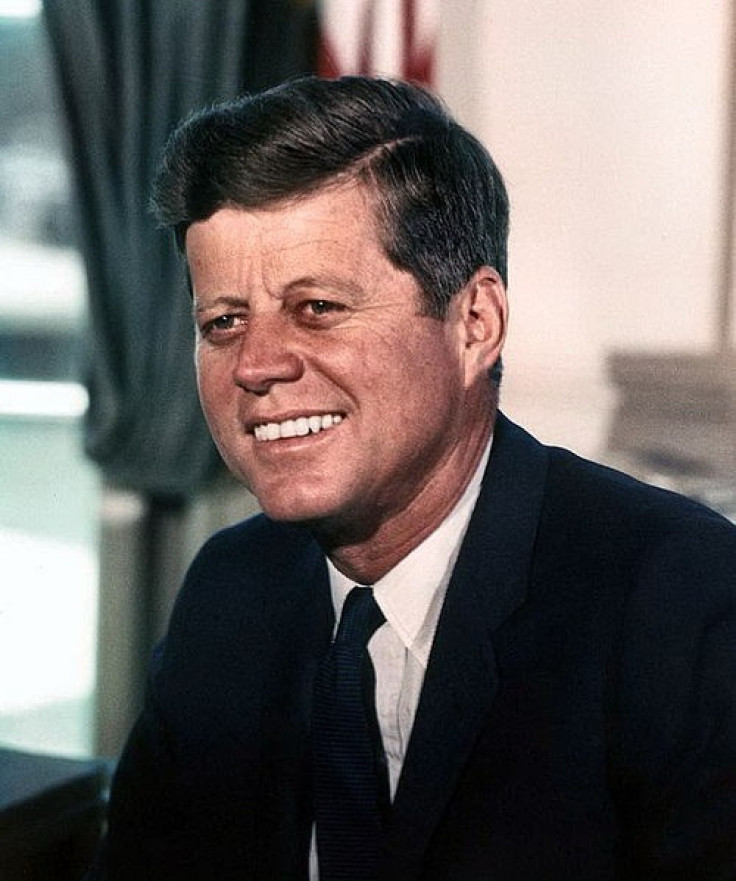JFK Tapes: Listen to Top 5 Excerpts from Kennedy's Final Secret Recordings [AUDIO]

In the final days before his assassination in 1963, secret tapes reveal, President John F. Kennedy chillingly predicted that Nov. 25 --the day that ended up being his funeral -- would be a tough day.
The tapes released by the John F. Kennedy Library & Museum on Tuesday include 45 hours of casual conversation caught by the president's secret Oval Office taping system, including a chat with his aide about scheduling a meeting with the leader of Indonesia.
When is he here, Monday? Well, that's a tough day, Kennedy says in the recording, taped on Nov. 20, 1963.
It's a hell of a day, Mr. President, his aide responds. He'll be coming back here though, I understand on Friday, because I offered to entertain at dinner.
Although the chatter was innocuous in context, history gives his words a much more unnerving meaning. Two days later, Kennedy was shot in Dallas. He was buried that Monday at Arlington National Cemetery.
The recordings are the last bit of more than 248 hours of tapes obtained by the Boston library. Captured in the audio are encounters in which Kennedy worries about how young people will perceive him in the upcoming 1964 election' He gets frustrated but stays patient when listening to conflicting reports from Vietnam, and talks cooperation with Soviet Foreign Minister Andrei Gromyko.
The library said that Kennedy intentionally created the recordings without his staff's knowledge.
Although on the one hand releasing the final recordings is a bittersweet milestone, on the other, we hope that the public will appreciate having the opportunity to hear these important discussions first hand, said Kennedy Library Archivist Maura Porter in a press release.
Vietnam
Kennedy sounds frustrated as he interrogates Gen. Victor Krulak and Joseph Mendenhall on Sept. 10, 1963, after their fact-finding mission to South Vietnam. Krulak gives an optimistic report on the progress of the war, while Mendenhall speaks of military and social discontent.
You both went to the same country? asks Kennedy. After some nervous laughter, he continues, Well, I mean how is it that you get such different--this is not a new thing, this is what we've been dealing with for three weeks. On the one hand you get the military saying the war is going better and on the other hand you get the political (opinion) with its deterioration ... now what--You two gentlemen are both--have a lot of experience. I have a lot of confidence in both of you. What is the reason for the difference--I'd like to have an explanation for the difference.
Planning for the 1964 Democratic Convention: Why They Want to Vote for Us
Kennedy's Nov. 12, 1963, conversation with a team of political advisers sounds a lot like something that would transpire in the Oval Office today. The president discussed about how they might sell their campaign to the younger people, party label.
But what is it that we can [do to] make them decide that they want to vote for us, Democrats and Kennedy--the Democrats not strong in appeal obviously as it was 20 years ago. The younger people, party label--what is it that's going to make them go for us. What is it we have to sell them? We hope we have to sell them prosperity, but for the average guy, the prosperity is nil. He's not unprosperous but he's not very prosperous; he's not going make out well off. And the people who really are well off, hate our guts. ... We've got so mechanical an operation here in Washington that it doesn't have much identity where these people are concerned.
Even the details - like whether or not the films played at the convention were to be in color or not--were of importance to Kennedy.
Should they be made in color? he asked. They'd come over the television in black and white. I don't know if maybe they'd come over the NBC one in color. Probably a million watching it in color and it would have an effect. I don't know how much more expensive it is. Be quite an effect on the convention. The color is so damn good. If you do it right
Foreign Relations with the Soviet Union
Although he took a tough stance against the Soviet Union while running for president in 1960, Kennedy worked to improve relations in 1963, the year after the Cuban Missile Crisis. In a meeting with Gromyko on Oct. 10, 1963, Kennedy sternly highlights the progress their two countries have made in their trade policy.
I don't want you to be discouraged. ... There is only a certain tempo which you can move in these matters, he said. We've gone ahead with the test ban, we've made some progress which for the United States is rather--do you realize that in the summer of 1961, the Congress unanimously passed resolutions against trade with the Soviets and now we're going ahead, we hope, with this very large trade arrangement that represents what's changed in American policy of some proportions. That's progress.
Something to Take to Texas with Me
In the final recording, Kennedy is heard making plans for Dallas on Nov. 20, 1963. The following day, he departs for Texas.
I'll tell you what, I'm gonna get whatever I need for these--they were going to have a briefing book for me by Saturday. I think I ought to be back here til maybe 7, then I have to see [Henry] Cabot Lodge on Sunday and then have to get in touch with him on Monday. So you ought to have something to take to Texas with me.
The complete recording can be downloaded here.
© Copyright IBTimes 2024. All rights reserved.











